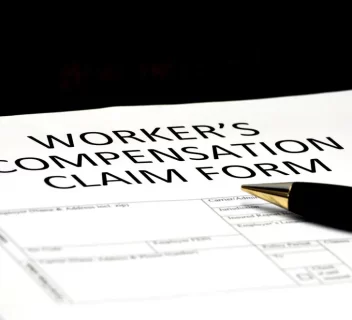Understanding the Difference Between Workers’ Comp and Employer’s Liability
Curious about the difference between workers’ comp and employer’s liability insurance? Workers’ compensation covers medical expenses and lost wages for employees injured at work, regardless of fault. Employers liability coverage, included in most workers’ compensation policies, protects businesses from financial losses due to employee lawsuits related to workplace injuries or illnesses, especially if employees claim the compensation isn’t enough and prove negligence. This article will help you understand how each type of insurance works and why both are crucial for workplace safety.
Key Takeaways
- Workers’ compensation provides no-fault coverage for employees’ workplace injuries, ensuring immediate financial support without needing to prove employer negligence.
- Employer’s liability insurance protects employers against lawsuits claiming insufficient workers’ compensation benefits, covering legal costs and damages related to employer negligence claims.
- Understanding the distinct roles of these insurances helps employers manage liability risks while ensuring employees receive necessary compensation for work-related injuries.
Distinguishing Workers’ Compensation from Employer’s Liability Insurance

Workers’ compensation insurance and employers liability insurance are designed to work in tandem, addressing both workplace injuries and the potential accountability of an employer. Workers’ compensation provides coverage for employees who sustain job-related injuries, dispensing medical care and financial support irrespective of fault. This system is structured to facilitate prompt access to treatment and income assistance without necessitating proof of negligence by the employer.
In contrast, employer’s liability insurance protects employers when employees assert that their workers’ compensation benefits did not suffice. Here, employee claims must establish employer negligence. Together these forms of liability insurance ensure remuneration for those injured at work while also safeguarding employers from allegations of neglect. The comparison between employer’s liability insurance vs workers’ compensation delineates each policy’s distinct provisions regarding indemnification and defense for involved parties.
What is Workers’ Compensation Insurance?
Workers’ compensation insurance, also known as workers’ compensation coverage, is specifically designed to handle expenses stemming from workplace injuries and does so without assigning blame to the employer. Although mandatory across most states with Texas being an exception, it functions on a no-fault system which absolves employees from establishing their employer’s fault as a prerequisite for receiving benefits. The rationale behind this system is its expeditious nature in providing assistance to injured workers, taking into account the cost of workers’ compensation insurance.
The coverage provided by workers’ compensation extends financial support for medical treatments and rehab services along with compensating for a fraction of lost wages due to a workplace injury. By covering necessary healthcare costs like treatment procedures, medications, and supplementing income partially lost during recovery time, it alleviates economic pressures off the shoulders of recuperating employees since concerns such as pain and suffering are not covered under this program.
By design, the primary objective of having worker’s compensation coverage in place is two-fold: it guarantees that staff sustaining work-related injuries obtain sufficient care promptly without engaging in fault determination processes while simultaneously shielding employers against drawn-out and expensive legal challenges connected with workplace accidents.
What is Employer’s Liability Insurance?
Workers compensation insurance serves to cover workplace injuries, providing benefits regardless of fault. If employees consider the workers’ compensation inadequate and seek additional damages alleging employer negligence, employers liability insurance cover comes into play. It provides financial protection for businesses facing lawsuits related to workplace injuries that are not fully addressed by workers’ compensation. This insurance is tailored to shield employers from legal actions stemming from such allegations by taking care of associated legal costs, settlements, or court-ordered payments.
Typically combined with workers’ compensation under what’s known as Part Two coverage—though not required in monopolistic states where it stands as suggested stop-gap protection—employer’s liability differs in that it includes expenses for punitive damages suits against an employer and accommodates a broader spectrum of claims beyond those directly compensated by workers’ comp.
Given its role in safeguarding businesses when worker’s compensation falls short, carrying employer’s liability insurance is crucial for any entity with staff members on board. Insurers advocate for this form of liability insurance to defend companies from exorbitant litigious burdens potentially devastating their finances through prolonged legal battles.
Coverage Details: Workers’ Compensation vs. Employer’s Liability
Employer’s liability insurance and workers’ compensation insurance serve related but separate functions. The former includes coverage for medical expenses, lost wages, and medical bills, among other things, as part of the broader protection offered by workers’ compensation. Businesses with employees are often mandated by most states to carry workers’ compensation insurance, making it an essential requirement for these companies.
What Does Workers’ Compensation Cover?
The workers’ compensation system is designed to provide benefits and support to employees who sustain injuries while on the job. The insurance mitigates financial strain by covering necessary healthcare services, including medical expenses for treatments and medications, as well as replacing a portion of lost wages during recuperation periods. Workers’ comp ensures that these benefits are available without requiring injured workers to pay from their own pockets. Workers’ compensation insurance costs can vary based on factors such as the type of work, location, number of employees, and the company’s claims history, with high-risk industries facing higher premiums.
If an injury prevents an employee from working, workers’ compensation assists by compensating for income not earned during this downtime. This enables individuals healing from workplace incidents to maintain their livelihoods while they recover. For more severe instances where long-term or irreversible disability arises due to work-related accidents, disability benefits under workers’ compensation play a crucial role in providing ongoing financial aid.
It’s important to note that despite its wide-ranging protection, pain and suffering are not included within the purview of worker’s compensation claims. Instead of addressing non-economic damages, the primary intention behind this form of insurance remains centered around enabling access to medical care required for physical recovery alongside supporting economic stability through replacement income measures.
What Does Employer’s Liability Insurance Cover?
Employer’s liability coverage is designed to handle the financial repercussions of an employee alleging that their injury resulted from employer negligence. This form of liability insurance safeguards employers against the costs associated with legal claims following workplace injuries, including fatalities arising from accidents or occupational diseases.
Claims typically encompassed by this type of insurance include those for work-related illnesses caused by exposure to dangerous substances, repetitive motion injuries such as carpal tunnel syndrome, and psychological distress claims stemming from work-induced stress or harassment. It also extends to situations where an employee’s family might be affected significantly due to loss of consortium claims because of a workplace injury.
This coverage addresses third-party-over actions in which a third party holds the employer responsible for harm resulting from faulty products. Employer’s liability insurance mitigates financial risks by covering legal defense expenditures along with any settlements or judgments handed down by courts regarding these diverse potential legal issues faced by employers.
Common Employer Liability Scenarios
Employer’s liability insurance serves as an addition to workers’ compensation, providing coverage for legal costs in instances where an employee files a lawsuit against the employer on grounds of negligence. This type of insurance encompasses numerous scenarios involving alleged employer malpractice.
Typical Claims Under Employer’s Liability Insurance
When an injured employee obtains workers’ compensation and then proceeds to sue a third party for playing a role in their injury, this leads to what is referred to as Third Party-Over Action. Should the third party claim that employer negligence played a part in causing the workplace injury, they might initiate legal action against the employer. Such actions can incur extensive legal costs and damages. These are typically covered by the employer’s liability insurance.
In instances of Dual Capacity claims, an individual may be both employed by and harmed due to products produced by their same employers. In such cases where consequential bodily injury occurs because of product use or malfunction at work, employees have grounds to pursue legal action against their employers under dual roles – that of worker and consumer. Employers are shielded from potentially large financial obligations through coverage provided by liability insurance policies.
Claims known as Consequential Bodily Injury provide family members with the right to seek reparations if they suffer indirectly due to workplace injuries sustained by an employee, including situations termed Loss of Consortium. These involve relatives claiming detriments like loss of intimacy or support services from spouses unable to perform those duties post-injury. Employer’s liability insurance extends its coverage across various forms of lawsuits, ensuring thorough protection for companies facing potential multiple facets of litigation stemming from employment-related incidents.
Proving Employer Negligence
Employees must establish that their employer acted negligently to succeed in a workplace injury claim. This involves showing the employer failed to provide a safe work environment. Documenting unsafe conditions and lack of safety protocols supports employer negligence claims.
Employees must show the employer had a duty to protect workers, breached that duty, and caused the injury to prove a liability claim. This requires thorough documentation and often legal assistance to navigate the claim’s complexities.
Employees must prove employer negligence in liability claims. This challenging process requires evidence and legal expertise to establish fault and secure compensation.
Navigating Workers’ Compensation Claims
Grasping the intricacies of the workers’ compensation process is beneficial for both employees and employers, as it allows them to handle such instances with greater efficiency. Legal experts are instrumental in assisting employers with managing liability claims and guaranteeing adherence to relevant regulations. To find a legal expert to help you with your case, contact 1-800-THE-LAW2 for a free consultation with an attorney in our network.
Types of Workers’ Compensation Claims
Common types of workers’ compensation claims include medical treatment, lost time, inability to return to pre-injury work, and inability to return to any work. Each type addresses different aspects of injury and recovery, ensuring that employees receive the appropriate benefits.
Medical treatment claims cover healthcare services for work-related injuries. They ensure injured employees access necessary treatments and medications without financial burden.
Medical treatment and lost time claims compensate for healthcare and lost wages. This type provides financial support during recovery, helping employees manage expenses while unable to work.
More severe cases involve claims where employees cannot resume previous roles due to their injuries.
Appeals Process for Denied Workers’ Compensation Claims
Employees may contest a denial of their workers’ compensation claim by submitting new evidence or explanations. They are allowed a specific window of time during which to challenge the ruling made regarding their workers’ compensation benefits by a judge. The grounds for appeal typically stem from disagreements related to the original evaluation of the claim.
Navigating through the intricacies of the appeals process for workers’ compensation claims can be quite complicated, usually requiring intricate legal documentation. It is often recommended that employees seek legal counsel when engaging in this process. Having an attorney can significantly enhance prospects for prevailing in an appeal against rejected claims, especially if there is no success on initial attempts at appealing.
Legal Considerations and Consulting Professionals
It is essential for businesses to engage specialized legal advisors in order to comprehend the intricacies of these claims and steer through the complex legal landscape. Consulting a legal expert plays a pivotal role in handling these matters effectively. Additionally, businesses should consider employment practices liability insurance (EPLI), which protects employers from employee-related claims such as wrongful termination, harassment, and discrimination, differentiating it from employer’s liability and worker’s compensation insurance.
When to Consult a Workers’ Compensation Lawyer
When dealing with complex claims or disputes with employers, it is crucial to seek the guidance of a workers’ compensation attorney. If an employee experiences a workplace accident, consulting with such an attorney can be pivotal in managing the situation.
It is advisable to obtain legal support if your claim has been rejected or if there are complications regarding benefit disagreements. A lawyer specializing in workers’ compensation will assist employees in securing their rightful benefits and handling complex legal matters. Contact 1-800-THE-LAW2 for assistance with finding a great workers’ compensation lawyer for your case.
Importance of Legal Defense in Employer’s Liability Cases
Employer’s liability insurance is imperative for safeguarding employers from financial repercussions by providing coverage for legal defense expenses, settlements, and any damages or judgments that may arise due to liability claims. This protection also extends to covering court costs associated with such claims. For successful navigation of employer liability issues and the formulation of effective defense strategies, seeking advice from skilled legal experts is vital.
Involvement in third-party over actions, loss of consortium cases, and dual-capacity lawsuits underscores the necessity for robust legal defenses afforded through employer’s liability insurance. These types of claims serve as a reminder of why it is essential to have mechanisms in place to defend against potential liabilities securely and ensure just results are achieved for employers.
Summary
Understanding the difference between workers’ compensation and employer’s liability insurance is essential for both employers and employees. Workers’ compensation provides no-fault coverage for medical expenses, lost wages, and rehabilitation, ensuring that employees receive the necessary support after a workplace injury. In contrast, employer’s liability insurance protects employers from lawsuits related to negligence and covers legal costs, settlements, and damages.
Both types of insurance work together to create a safer and more secure workplace. By understanding their roles and coverage details, employers can better protect their businesses, and employees can ensure they receive the benefits they deserve. Whether you’re navigating a claim or considering legal assistance, this guide provides a comprehensive overview to help you make informed decisions. If you’re looking for legal assistance, contact 1-800-THE-LAW2 for a free consultation with an attorney in our network.
Frequently Asked Questions
What is the primary difference between workers’ compensation insurance and employer’s liability insurance?
Workers’ compensation insurance provides coverage for employees who suffer work-related injuries on a no-fault basis, whereas employer’s liability insurance protects employers against negligence lawsuits when workers’ compensation claims are insufficient.
What types of claims are typically covered under employer’s liability insurance?
Employer’s liability insurance is vital for safeguarding businesses from legal claims that may result from workplace incidents, including consequential bodily injury and allegations of employer negligence. This type of liability insurance provides coverage for third-party-over actions, dual capacity claims, loss of consortium, and other related issues.
How does workers’ compensation insurance benefit employees?
Workers’ compensation insurance offers essential assistance to employees, covering their medical expenses and treatment costs, as well as compensating for a portion of lost wages due to injuries sustained at work. This ensures that they get the needed care without having to demonstrate employer fault.
When should an employee consider consulting a workers’ compensation lawyer?
Employees should consult a workers’ compensation lawyer if their claim is denied, if they encounter complex legal situations, or if their employer challenges the claim.
Seeking legal help can effectively navigate the appeals process and secure the rightful benefits.
What role does employer’s liability insurance play in legal defense?
Employer’s liability insurance plays a vital role in legal defense by covering legal fees, settlements, and associated court costs related to liability claims, thereby protecting employers from potentially costly lawsuits.
This insurance is essential for effective claims management and safeguarding business interests.




